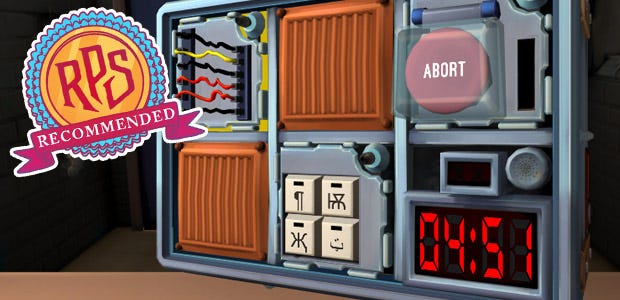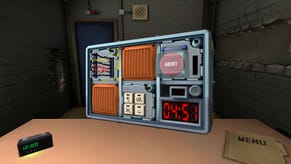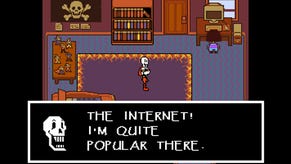The RPS Verdict: Keep Talking And Nobody Explodes
A co-op game about bomb defusal.
Keep Talking And Nobody Explodes [official site] is a co-op game for two or more people where one is faced with a bomb covered in symbols, buttons, mazes and counters, and everyone else is looking at a defusal manual. They must keep talking to solve those puzzles, or somebody explodes. Pip, Adam and Graham took it in turns to explode, then gathered themselves to discuss the finer points of bomb defusal.
Graham: Four symbols! Pig's tail; lightning bolt; apostrophe bum; triangle spiderman. In what order do I press them?
[A few minutes pass while Adam and Pip get coffee, during which Graham is browsing the bomb manual.]
Upon review, this challenge might reveal that I did not realise how the symbol puzzle worked until this very second. All the symbols shown are always present in a single column?
Pip: The symbol puzzle was my favourite. Partly because I found it the easiest, but partly because I like how fast we all developed a shared vocabulary. We all ended up knowing what "triangle spiderman" was and there's a shared concept of "apostrophe bum" that's sure to come in useful in all manner of other social situations.
The idea was that you (the defuser) have four symbols and we (the bomb defusal experts) had a set of columns containing symbols, like letters from other alphabets. As you described them we could narrow down which column you were actually talking about and then tell you the order they appeared in that column so you knew the order in which to press them. It was neat but also really funny.
Graham: I didn't realise that the four presented symbols always appeared within the same column. I thought they could be in different columns, and after that led me to give incorrect advice, I decided you must have to read from top-to-bottom and then from left-to-right. I am a fool.
The shared language thing was interesting, especially when we first swapped around and I became a manual-reader and Adam became the defuser. He initially had a different langauge than me, and it took me a moment to realise that his "cursive c and o" was my "curly pig's tail."
Adam: My visual memory, or visual imagination - whatever the thing is that makes me describe things in weird ways - is atrocious. I can lose a game of Guess Who against a 4 year old.
What I loved about the game is how quickly I fell into the role. Very serious, very determined to win, because winning meant saving somebody from a bomb. It felt very intense, even though there was plenty of laughter. My laughter was mostly nervous, I think.
With games about communication, there’s often too much pressure on one person to lead, which can leave others in the background, simply following along. The really clever thing about Keep Talking is that the defuser, the person in the room with the bomb, has to provide the experts with information, and they have to decipher it and feed back. That back and forth ensures that everyone is thinking and reacting rather than simply following instructions quietly.
Pip: We ended up assigning tasks as well. I had the symbol one but you were better at the one where you cut wires. I think we were both pretty much equal when it came to pressing buttons. I think that helped it flow and saved us some time.
Adam: And everyone was fucked when it came to Morse Code. I mean, really. That was just rude. There came a point when we were trying to decipher the actual instructions while the poor sap with the bomb in front of them was just listening to confused ‘um’s and ‘ahs’.
I wonder if certain kinds of brain will decipher certain modules more readily? I found the wires really easy but because they’re the first thing in the manual, I assume that’s because they’re like Baby’s First Bomb. The Fisher Price module. The maze baffled me even when I understood it and I know from experience that I have really bad spatial sense. That maybe ties in?
Graham: I think underlying strengths probably play a part when it comes to the confidence with which you approach each challenge. Looking at the symbols puzzle now, it looks straightforward, but my issue in the moment was that I didn't fully read the instructions. I lacked confidence in the face of a wall of strange shapes and so didn't feel like I had time to learn how to use them properly - which is dumb, I know.
They're not even long instructions. There's an underlined heading in bold, a small italicised piece of writing beneath that, and then two sentence-long bullet points. That's it. But when there's a counter ticking down, even one I can't see, I panic and dismiss the header and small italics as unimportant, and then try to skim-read the bullet points. I wonder if typography and the cues that sends about which pieces of information are important is a deliberate part of the game design.
Pip: There's one module in the manual called "Complicated Wires" and looking at that one I can feel my brain panicking. It's like normal wires except now some of them are STRIPEY and there are LEDs involved and the solution is this weird Venn diagram that looks more like some horribly complicated planetary orbit. Go look at it and tell me how it makes you feel. It's page 13.
Graham: Ill. I remember scrolling past it while looking for other things in the menu and… oh god. The orbital paths come in different types of lines: solid, small dots, big dots, dashes, dots and dashes. Oh god.
Adam: Do you think the setup is important and effective? The actual bomb theme? If this were a Crystal Maze game, say, would it be as enjoyable? I do love the tension and the little touches that make the bomb more tactile than I’d expected - being able to pick it up and turn it around.
Graham: I think the theme is important mainly because bombs and bomb defusal are things we know so well from other media. We understand that tension and that role, in a way that might be less apparent if it was the more general puzzling of a Crystal Maze. Unless Richard O'Brien was there, berating us.
I think there's something really interesting though in how dedicated we were. I know for me, at least, I felt in some way like I was inhabiting a role - and much more so than I do when playing something like D&D. I think having information that other people don't is a much more powerful prompt to inhabiting a part than even being given character traits like, "Oh, you're a surly dwarf." I don't know how to play that. But having information someone else doesn't makes me play professionally or, in a strategy game, deviously.
Adam: I noticed myself making daft jokes and that was a genuine attempt to alleviate tension. Makes me rethink the whole ‘quipping action hero’ trope; they’re trying to hold onto their humanity rather than trying to make the audience laugh, I guess. It made a difference when Pip was defusing the bomb a well because I could hear the beeps and clicks of buttons through her headset, whereas Graham’s cut out all of the background noise. I didn’t even know he’d exploded until he told me.
Pip: Typical Graham.
The thing that was putting me on edge was that sometimes the lights cut out for a few seconds or you'd trigger some different sounds and each time it was like "did I do something wrong with the bomb?". When you get stuff wrong and the timer speeds up is also really stressful. I felt like my heart rate was trying to match the faster beeping!
But you know what's also stressful? When a colleague decides that they are going to pretend there's a whole minute less on the countdown timer than there really is to get you to solve the modules even faster. That, Adam, is stressful.
Adam: All I’ll say about that is this: if there was at least a minute left, I was doing something right. Stress is a great motivator and oh god I’d be an awful person if anyone ever gave me any kind of control or power.
I think I preferred being the defuser, as opposed to the expert. And that’s probably because I did feel less responsibility for my own fate but also because I think I’m better at communicating what I see than trying to understand what somebody else is looking at. Except the symbols, obviously, which I can’t describe AT ALL. “IT’S THE ILLUMINATI BUT WITH A WALKING STICK” “it’s an ‘A’, Adam.”
Graham: I deliberately didn't look at the manual at all before playing, and I think that made it more fun for me when we started. I was the first person to be the defuser and I had no idea which pieces of information in front of me were important and which weren't. I know now, for example, that empty spaces in the rack of wires don't matter, and neither do the positions of the symbols in the 2x2 grid, but at the time it felt important to say that the lightning bolt was in the top left and that the wires went black, black, empty space, white, empty space, and so on.
It feels to me like a game about learning to play the game. It's a tutorial with friends. And for that reason, I think you could probably put it in front of a non-gamer and they'd have fun with it as much as anyone else. But I'm wondering whether going second or third as defuser, when you'd already seen the manual, changed your experience any? Do you think it would have been more fun to go in blind?
Pip: Something I remarked on at the time was because the symbol puzzle was one of the basic ones it appeared a lot, and as I was the one in charge of that puzzle I got super familiar with the columns. As a result, when it was my turn and I got a symbol puzzle I knew the order to press them because I could picture the column in my head. I waited for you guys to tell me because I didn't want to explode from hubris but I'd say that was a very different experience from the one you or Adam had.
The first time I was totally in the dark was when we hit a Morse Code puzzle. That was the first time we'd encountered one and I had no idea which bits of information to give you. I also struggled to tell the difference between the dots and the dashes that the light was flashing so I couldn't relay the info properly. I think that's the closest I had to your experience, Graham – that not knowing what the puzzle was or what info was valuable. It's also the puzzle that got me exploded.
Adam: It’d be interesting to see how far that prior knowledge can take a defuser. It might be a bit like a doctor treating another healthcare professional, having every diagnosis second-guessed. If I’m telling you how to decode a Morse Code puzzle and you’re like “I’m one step ahead of you”, and then get a strike, that’s going to create a new kind of tension. The kind of tension that arises when somebody gets too smart and winds up their superiors (people with manuals are definitely superior to people trapped in a room with a bomb).
I imagine later on there will be situations in which some modules might be possible to solve without access to the manual, so the defuser can work at those based on memory while the expert works toward a solution for whatever else is going wrong. We’ve only played the first few stages, after all. And it’s worth mentioning that I say ‘stages’ but the bombs aren’t predetermined - the time, number of mistakes you can make, and approximate types and number of module are set, but there is randomisation.
Graham: Although you guys had a different experience of defusing than I did, because you'd seen the manual first, I guess the opposite is true, too. When I saw the manual for the first time, I already had a little pre-existing understanding that changed the experience.
I died on a Simon Says puzzle, because we were low on time and we'd never seen it before and you were both trying to comprehend the instructions for the first time. When that puzzle came up next, I was on the manual, and I didn't feel the same panic I would have done because I knew what Adam was seeing as the defuser and what information was immediately important… Although I think I still got it wrong while Pip deciphered that one, anyway.
And yeah, it's worth noting that the difficulty curve seems really carefully pitched, too. You and I both died on the same stage, Adam, even though it had different modules. You didn't have a Simon Says. I think that's a good sign, and I think it's also a good sign that we then got Pip one stage further.
Pip: I'd be really interested to know how the game is balanced in terms of time on the clock and the modules you'll get. I'm assuming there's an average completion time for each module but I'm now looking at a puzzle about passwords and thinking "yes, I'd say the average completion time on that would be an hour".
You rehearse and you develop shorthand as a group and the average time to complete things goes down which is, I think, how we got further on that third run than the previous two. It reminds me of boardgames like Articulate or Pictionary in that way – after a few rounds you get a better sense of how to deliver and receive information with a particular person. But I also wonder whether you think there's a sweet spot with this game in terms of the knowledge and ignorance?
When I play Articulate or Pictionary I only last a few rounds because the experience stops feeling varied or surprising after that. I wonder if we played more we would encounter that same sensation and need to either take a break and go back when the memory was a bit hazy or start seeing other bomb defusers…
Adam: Thinking of it in terms of roleplay, those first games seemed to me like an unexpected situation. Graham had been pottering around in his garden and had discovered a ticking box, so called an emergency helpline to try and save his wisteria from a fiery doom.
If we all played together regularly and were encountering really devious bombs - and some of the later ones have modules that activate and interrupt you while you’re trying to work on their neighbours - then I’d imagine us as an elite bomb squad, sent to handle dangerous situations. The defuser would have been sent in deliberately rather than happening across something unpleasant that ticks threateningly. Not sure if that actually answers the question but it is an insight into my daft brain.
Graham: It is maybe worth watching this video, which shows a team of experienced players tackling a high difficulty bomb with something approaching military proficiency. I say "something approaching" because, although they are quick and experienced and doing something extremely complicated, there's still jokes and smiles. It's actually this video that made want to play the game, though I'd forgotten all the details of it in the weeks since:
It suggests that the challenge ramps up in such a way that there's always tension, which I think would keep the game exciting even as parts of became familiar in a way that you maybe don't get with Pictionary.
Pip: I can't even deal with this video – they're so good! It's fascinating looking at how they've refined their ways of speaking about the puzzles, particularly that needy dial and the complex wires. We never even tried starting one puzzle and then moving to another to maximise our time efficiency. I kind of assumed once you started one that had multiple stages you were committed to it.
Adam: Watching that video has caused me to explode. Proper bomb-people would definitely piss on the gleeful sense of victory I feel when I solve a wire module in twenty seconds rather than thirty. This is terrible. A bomb is definitely going to haunt my dreams tonight.
Graham:The clock on this discussion bomb is ticking down, which means it's time to finish up. I loved playing Keep Talking. I think it's the most fun I've had in a cooperative game in a long time. I'd recommend it to everyone. I wish I was playing it right now. You two?
Pip: Same. I really loved it, both as a game but also as a way of facilitating time with friends. The biggest part for me was that sense that everyone had a role. In a lot of co-op or team-based multiplayer games I play you get people who take on the captain role and that can leave other players a bit... backgroundy. With this it felt like you had to have everyone involved because of how the information passing works and how the time constraints work. That sensation might diminish quickly as the group gets bigger or if people are shouting over one another but for the three of us it was really gratifying.
Adam: Agreed. I want to play more. I’d play more right now if I had time. One final thought - I like that the game didn’t make me feel stupid. When I looked at the manual, I felt very stupid but within the context of the timer and all of that tension, mistakes feel natural. I effectively murdered Pip by messing up a module that I’d made notes about and everything, but that felt like something that could have happened to anyone.
Let’s be clear that none of the explosions were my fault, is what I’m saying.
Pip: That Morse module would have seen me off anyway. I was murdered by Morse :(
Adam: The Remorseful Day :( :(
Keep Talking And Nobody Explodes is out now for Windows.





















